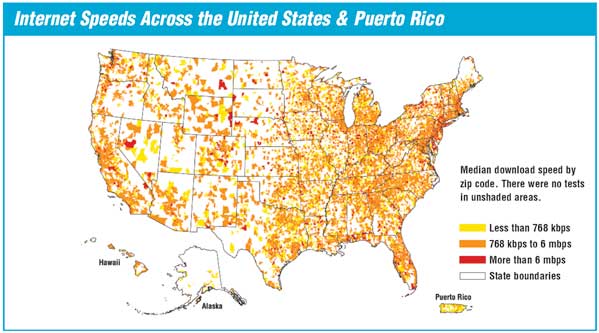Group Calls For Faster U.S. Broadband Speeds
The high-speed Internet advocacy Web site, Speed Matters, has just released a report on the average Internet connection speeds by U.S. state. If you live in Rhode Island (6,769 Kbps), Delaware (6,685 Kbps), New Jersey (5,825 Kbps), Virginia (5,033 Kbps), or Massachusetts (4,564 Kbps), you can take pride that your state has one of the fastest average Internet downstream connection speeds in the U.S.
But before you get too smug, compare your speed against the average 63 Mbps downstream speed that the Communications Workers of America (CWA) claims Japan has... Or South Korea (49 Mbps), Finland (21 Mbps), France (17 Mbps), or even Canada (7.6 Mbps) for that matter.

The report states that the overall average dowstream speed for the U.S. is just 2.3 Mbps--only 0.4Mbps faster than the previous year. The states (or territory) with the slowest average downstream speeds are Puerto Rico (499 Kbps), Alaska (814 Kbps), North Dakota (1,164 Kbps), Montana (1,320 Kbps), and Wyoming (1,325 Kbps). As far as upstream speeds go, the U.S. average is 435 Kbps, with the fastest state, Delaware, at 1,483 Kbps, and the slowest state, Alaska, at 246 Kbps.
These results were collected from a survey of almost 230,000 Internet users who used the Speed Matters Internet speed test between May 2007 and May 2008. The Speed Matters site is an advocacy arm of the CWA, a large labor union of communications and media workers. The mission of the site is to promote high-speed Internet connections in the U.S., for economic growth, global competition, and to get broadband Internet connections into the homes of low-income families.
"This isn’t about how fast someone can download a full-length movie. Speed matters to our economy and our ability to remain competitive in a global marketplace. Rural development, telemedicine and distance learning all rely on truly high-speed, universal networks." -- Larry Cohen, CWA President
The report offers an eight-step plan for how the CWA envisions the U.S. can meet the CWA's mission:
At least some of these steps are part of the Broadband Data Improvement Act, which was introduced by Senator Daniel Inouye (D-HI) in May 2007. The bill is currently with the Senate Commerce, Science, and Transportation--of which Senator Inouye is the chairman.
If you'd like to see how your downstream and upstream speeds compare to your neighbors, check out the Speed Matters Internet speed test here. How do your speeds compare to your state's average? Let us know in the comments below.
But before you get too smug, compare your speed against the average 63 Mbps downstream speed that the Communications Workers of America (CWA) claims Japan has... Or South Korea (49 Mbps), Finland (21 Mbps), France (17 Mbps), or even Canada (7.6 Mbps) for that matter.

Credit: Speed Matters
The report states that the overall average dowstream speed for the U.S. is just 2.3 Mbps--only 0.4Mbps faster than the previous year. The states (or territory) with the slowest average downstream speeds are Puerto Rico (499 Kbps), Alaska (814 Kbps), North Dakota (1,164 Kbps), Montana (1,320 Kbps), and Wyoming (1,325 Kbps). As far as upstream speeds go, the U.S. average is 435 Kbps, with the fastest state, Delaware, at 1,483 Kbps, and the slowest state, Alaska, at 246 Kbps.
These results were collected from a survey of almost 230,000 Internet users who used the Speed Matters Internet speed test between May 2007 and May 2008. The Speed Matters site is an advocacy arm of the CWA, a large labor union of communications and media workers. The mission of the site is to promote high-speed Internet connections in the U.S., for economic growth, global competition, and to get broadband Internet connections into the homes of low-income families.
Credit: Speed Matters
"This isn’t about how fast someone can download a full-length movie. Speed matters to our economy and our ability to remain competitive in a global marketplace. Rural development, telemedicine and distance learning all rely on truly high-speed, universal networks." -- Larry Cohen, CWA President
The report offers an eight-step plan for how the CWA envisions the U.S. can meet the CWA's mission:
- "Establish a national policy goal" of constructing an infrastructure that supports 10 Mbps downstream and 1 Mbps upstream by 2010.
- "Develop state and national maps" of broadband deployment, adoption, speed, and prices.
- "Create public-private partnerships" and task forces to stimulate high-speed Internet deployment and adoption.
- Reform universal service subsidies to "support affordable, high-speed Internet for all."
- Adopt programs that "provide free or low-cost computers to low-income households, expand community-based digital literacy, and fund grants for community-based public-interest broadband applications and services."
- Create government "subsidies, low-interest loans, and tax incentives" to spur "the deployment of faster networks."
- Ensure that there is "no degradation of service or censoring any lawful content," while recognizing that "reasonable network management is necessary to preserve an effective open Internet."
- Create public policies that protect consumers and workers, and that "should support the growth of good, career jobs, and require the public reporting of deployment, actual speed, price, and service."
At least some of these steps are part of the Broadband Data Improvement Act, which was introduced by Senator Daniel Inouye (D-HI) in May 2007. The bill is currently with the Senate Commerce, Science, and Transportation--of which Senator Inouye is the chairman.
If you'd like to see how your downstream and upstream speeds compare to your neighbors, check out the Speed Matters Internet speed test here. How do your speeds compare to your state's average? Let us know in the comments below.


